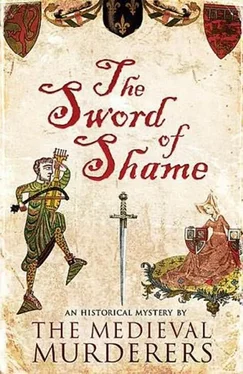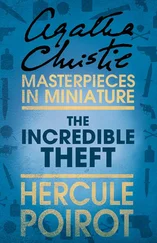The Medieval Murderers - Sword of Shame
Здесь есть возможность читать онлайн «The Medieval Murderers - Sword of Shame» весь текст электронной книги совершенно бесплатно (целиком полную версию без сокращений). В некоторых случаях можно слушать аудио, скачать через торрент в формате fb2 и присутствует краткое содержание. Жанр: Исторический детектив, на английском языке. Описание произведения, (предисловие) а так же отзывы посетителей доступны на портале библиотеки ЛибКат.
- Название:Sword of Shame
- Автор:
- Жанр:
- Год:неизвестен
- ISBN:нет данных
- Рейтинг книги:4 / 5. Голосов: 1
-
Избранное:Добавить в избранное
- Отзывы:
-
Ваша оценка:
- 80
- 1
- 2
- 3
- 4
- 5
Sword of Shame: краткое содержание, описание и аннотация
Предлагаем к чтению аннотацию, описание, краткое содержание или предисловие (зависит от того, что написал сам автор книги «Sword of Shame»). Если вы не нашли необходимую информацию о книге — напишите в комментариях, мы постараемся отыскать её.
Sword of Shame — читать онлайн бесплатно полную книгу (весь текст) целиком
Ниже представлен текст книги, разбитый по страницам. Система сохранения места последней прочитанной страницы, позволяет с удобством читать онлайн бесплатно книгу «Sword of Shame», без необходимости каждый раз заново искать на чём Вы остановились. Поставьте закладку, и сможете в любой момент перейти на страницу, на которой закончили чтение.
Интервал:
Закладка:
The woman and I walked down a passage and came to a kind of lobby where the taper’s uncertain light showed a couple of doors.
‘Elias is in that room,’ she said, gesturing with the hand that held the candle. She spoke in a whisper. I lowered my head in case she was going to say anything else but she remained silent. I remembered the muffled knocker on the door.
‘Is he sick?’ I said.
‘Sick enough,’ she said, then added under her breath, ‘And like to die, they hope.’
They? She must have meant the three men out in the hall. I grew even more uncomfortable.
‘Then there’s not much point in seeing him…’ I said, ‘…if he is so ill…I really wouldn’t want to disturb him…I have come only to convey my shareholders’ respects and to enquire if the master of the house has any preference for the play which he would like us to perform here next summer.’
‘Play?’ she said.
‘Yes,’ I said. ‘Play. The King’s Men can do things at the last moment of course. We’re very good at last moment things. Though all in all, and taking the rough with the smooth, it’s best to know in advance what the patron requires. That way we can ensure we have everything we need before we set off from London.’
I was babbling away like this, in a half whisper and scarcely aware of what I was saying, because I had a growing sense that something was terribly wrong.
‘Elias likes plays,’ she said after a pause, ‘but I do not know of any performance next summer. Indeed I am surprised that he should be thinking so far ahead. A performance in this house?’
‘Madam,’ I said, ‘you have me altogether at a disadvantage. I have come here on the understanding that Mr Maskell wants us to stage a drama for himself and his, er, family next summer. Mr Roger Maskell. For a wedding perhaps. A private performance is often desired at a wedding.’
‘Maskell?’
‘Yes, Maskell.’
She laughed, a low sound, quite an attractive one, but my guts did a little dance to hear it.
‘Why, we are all Haskells in Valence House. I am a Haskell too. There are no Maskells here though I believe there is a family of that name on the other side of Cambridge. You have taken a wrong turning. You have come to the wrong house, Master Revill.’
Somehow the fact that she’d got my name right after hearing it only once made my blunder even more humiliating. Of little use to complain that I’d been directed here by that helpful fellow from one of the university colleges. Too late I remembered that he’d been somewhat hard of hearing and that I’d had to bellow the name in his ear. He must have misheard me when I asked for the whereabouts of the house and family. Had picked up Haskell and not Maskell. Told me they lived in Ickleton, south of Cambridge. Even drew a chart of how to get here, which I followed faithfully. Nobody’s fault but my own. I was glad of the near-darkness of this lobby. I went red in the face and started to sweat.
Fool, Revill! Twenty times over, fool!
How my company would laugh if they ever got to hear of this misadventure (which they wouldn’t, I determined there and then). I must leave the Haskell home straightaway, ride or walk back to Cambridge through the dark and snow, find the whereabouts of the Maskell dwelling and conclude my business there tomorrow.
But my business here was by no means done.
I don’t know whether it was the conspiratorial way we’d been keeping our voices down, or the fact that the Haskell woman was quite a lot younger and more attractive than I’d first taken her for, or the general strangeness of the whole situation, but the next thing I found myself saying was: ‘What do you mean, they hope he’s like to die? Who are they? Who is Elias? Who are you ?’
These questions were a bit direct, perhaps. But then I’d blundered in so deeply by now that a bit of outright curiosity hardly counted.
‘I am Martha Haskell,’ she said. ‘Elias is my uncle and the head of this house. My father was his younger brother. The men downstairs are part of the family too, distant cousins.’
‘They are here because they think your uncle is…dying?’
Again she laughed that low, fetching laugh. Was she heartless? I didn’t think so, instinctively I didn’t think so.
‘Elias has always been a mischievous man. My uncle is not well, there is no doubt about it. But he has played this game before. About three years ago, it was put abroad that he was on his death-bed and the cousins flocked here like so many carrion birds. He wanted to see who came to curry favour and was pleased at the expressions on their faces when he recovered. They brought gifts as tokens-of course they couldn’t ask for them to be returned afterwards. Some of them even altered their wills in his favour, hoping to outlive him by many years.’
‘Has the gentleman no wife?’
‘She is long since dead.’
‘No children?’
‘No children,’ she repeated.
‘You mentioned your father just now. What about him?’
‘All dead and gone. I am the closest in blood to Elias.’
‘Well then…?’
What I meant was that she should surely be the one to inherit this ramshackle estate when Elias Haskell decided to stop his games and die for good. But considering that Martha and I had only met a few minutes earlier and that I’d already shown a deal of curiosity, this might be a step too far even though we were still talking by conspiratorial candlelight.
At once there came a voice from within the chamber which she’d identified as Elias’s. The voice was thin and querulous but penetrating.
‘You’ve been whispering out there long enough. I can recognize your tones, Martha, but who’s that with you?’
‘You’ll have to go in and see him now, Nicholas Revill,’ she said. ‘Explain how you confused your Maskells and your Haskells. He might be amused.’
She didn’t sound very hopeful of this last proposition. But it was the least I could do, for her if not for the individual who lay beyond the door. Besides I was curious to meet this mischievous person who exaggerated his illness in order to tease his would-be heirs. It was the kind of far-fetched thing which might happen in a play.
She put her free hand on my arm and directed me to open the door. I crossed the threshold. The first thing that struck me about the room was the smell, a kind of warm, musty smell, as of a place which has been long occupied and rarely aired. By now my eyes were adjusted to the indoor gloom, even though there was little light inside the chamber.
A fire slumbered under another ornate chimney-piece. The chamber was full of furniture: chests, tables, an old coffer-seat, and other items piled into dark corners. There must have been a window in the facing wall but heavy curtains shut out the winter evening. Everything looked old and fusty. The largest and fustiest item was a great bed with bulbous foot-posts supporting the tester overhead. Under an ornate coverlet was a figure half sitting, half lying, propped against a mound of pillows. A large woman wearing a brown overdress was leaning in a familiar manner against the bed, wrestling with the pillows. I was surprised to see two people in the room, since I hadn’t hear any sound of conversation from outside. I halted some way from the bed, the momentary sense of conspiracy which Martha and I had enjoyed now gone.
Elias Haskell waved a stringy arm at the woman, who was kneading his pillows with her powerful hands. ‘That’s enough, Abigail. I am quite comfortable.’
‘Thank you, Abigail,’ said Martha.
The woman did not go immediately but delayed to fiddle with some items, a bowl and a few stoppered bottles, which were disposed on a table by the side of the bed. She scowled at me as she passed.
Читать дальшеИнтервал:
Закладка:
Похожие книги на «Sword of Shame»
Представляем Вашему вниманию похожие книги на «Sword of Shame» списком для выбора. Мы отобрали схожую по названию и смыслу литературу в надежде предоставить читателям больше вариантов отыскать новые, интересные, ещё непрочитанные произведения.
Обсуждение, отзывы о книге «Sword of Shame» и просто собственные мнения читателей. Оставьте ваши комментарии, напишите, что Вы думаете о произведении, его смысле или главных героях. Укажите что конкретно понравилось, а что нет, и почему Вы так считаете.












